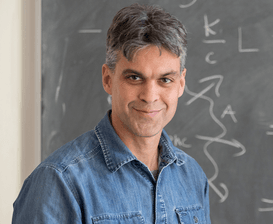
San Francisco, California – June 20, 2025
The Astronomical Society of the Pacific (ASP) announces Enrico Ramirez-Ruiz as its first Latino President of the Board of Directors in the organization's 135-year history. Ramirez-Ruiz is a professor and holds the Vera Rubin Presidential Chair of Astronomy and Astrophysics at the University of California, Santa Cruz.
The ASP is pleased to announce the new President of its Board of Directors, Enrico Ramirez-Ruiz, Professor and the Vera Rubin Presidential Chair of Astronomy and Astrophysics at the University of California, Santa Cruz (UCSC). The Society was founded in 1889 by the first Director of the Lick Observatory, Edward Holden. The founding members and officers were all from the San Francisco Bay Area, but the Society soon grew into a national and international organization. The first Board President from outside the Bay Area was elected in 1927, the first one from outside the U.S. in 1956. Some of the most respected astronomers in the world have served as Board Presidents, including James Keeler (1900), Edwin Hubble (1933), Frank Drake (1989), Alexei Filippenko (2001), Kelsey Johnson (2019), and Derrick Pitts (2023). The newly elected vice-president of the Board of Directors is Professor Katy Rodriguez Wimberly of California State University, San Bernardino.
Ramirez-Ruiz earned a B.S. in physics from the Universidad Nacional Autónoma de México and a Ph.D. in astrophysics from the University of Cambridge. Since joining the UCSC faculty in 2007, he has won several awards for his research, including a Packard Fellowship, the NSF CAREER Award, the Bouchet Award from the American Physical Society and the HEAD Mid-Career Prize from the American Astronomical Society. In 2020, he was elected to the American Academy of Arts and Sciences.
To become a leader of a community of educators and astronomers that includes some of the country’s leading thinkers - people who have shaped the field in recognizable ways - is at once humbling and incredibly motivating. I am transported by the thought of collaborating with innovative thinkers, leaders, and educators to advance the Astronomical Society of the Pacific’s mission and excited at the prospect of contributing in meaningful and impactful ways, given my demonstrated success and commitment to establishing supportive and transformative teaching, mentoring, and research training environments.
I am confident that I can help co-create a successful future for the Astronomical Society of the Pacific, given its talented staff. I appreciate the opportunity to be considered for this important role.
— Enrico Ramirez-Ruiz
For over 14 years, Ramirez-Ruiz has built STEM training research programs, and his mentees encompass over two hundred students, postdoctoral fellows, and junior faculty. In addition to his record of success as a research adviser, the mentoring program he created, Lamat (“star” in Mayan), has been remarkably successful at increasing the number of historically marginalized (HM) students who earn PhDs in astrophysics. Women and HM students comprise 83 percent of the 145 Lamat participants since its inception in 2010. Ramirez-Ruiz personally mentored 35 Lamat students and 39 graduate and postdoctoral fellows in his group. Twelve won NASA postdoctoral fellowships, the most prestigious in the field, and 19 are now professors. Together with Lamat, he has trained half of all HM students receiving astronomy PhDs in the country in the past five years. In 2022, he received the Presidential Awards for Excellence in Science, Mathematics, and Engineering Mentoring.
About the ASP
The ASP is a 501c3 nonprofit organization whose mission is to use astronomy to increase the understanding and appreciation of science and to advance science and science literacy. The ASP connects scientists, educators, amateur astronomers and the public together to learn about astronomical research, improve astronomy education, and share resources that engage learners of all kinds in the excitement and adventure of scientific discovery. Current ASP programs and initiatives support college faculty, K-12 science teachers, amateur astronomy clubs, science museums, libraries, park rangers, and girl scouts, to name a few.
Image: Professor Enrico Ramirez-Ruiz (Photo by Frederic Aranda)
